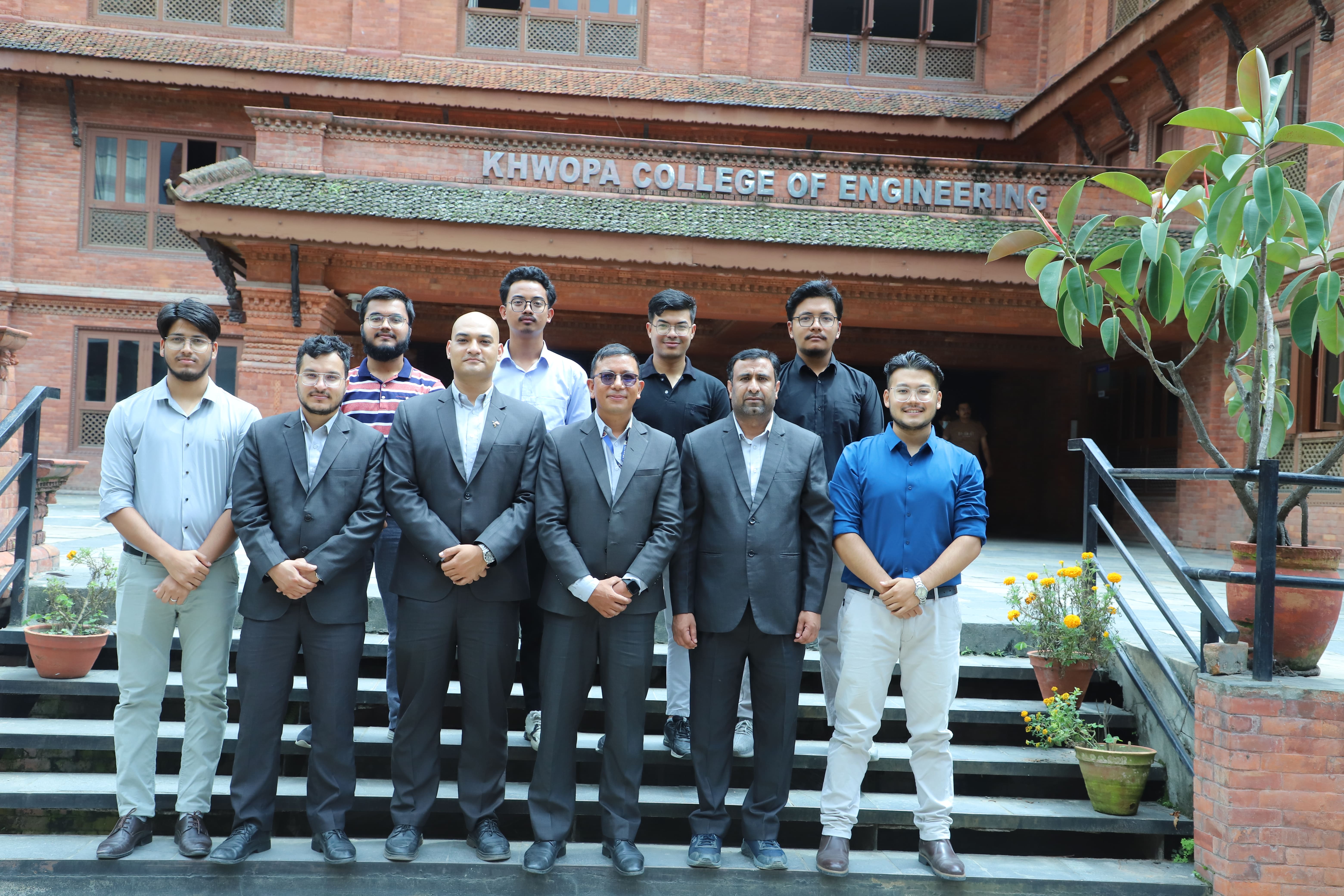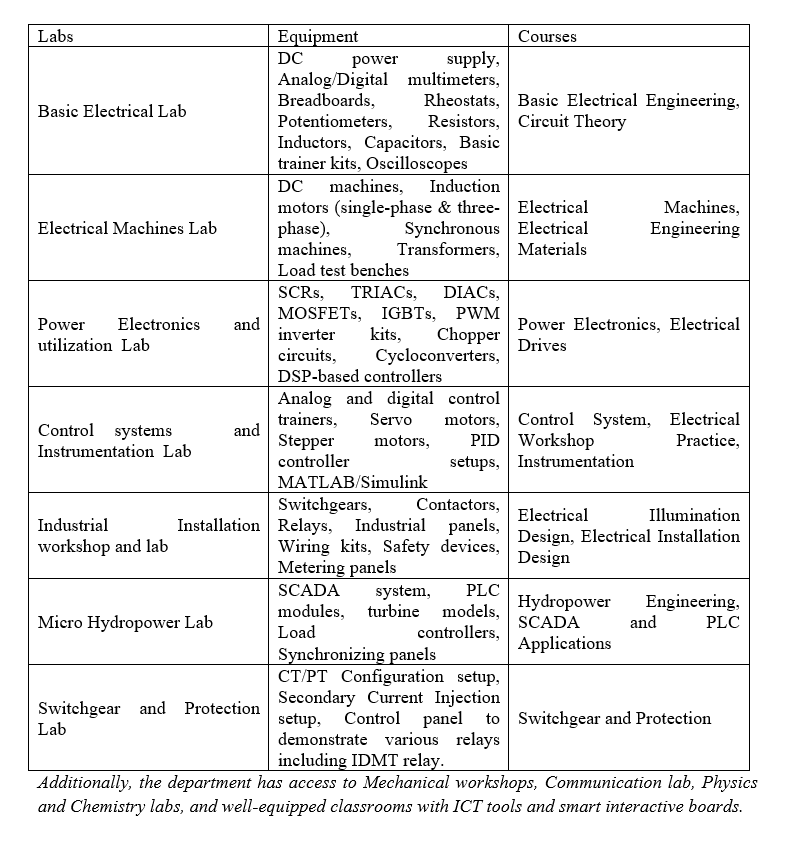Department of Electrical Engineering

Introduction
Electrical Engineering stands at the heart of the modern technological world, playing a vital role in energy systems, industrial automation, smart infrastructure, and digital communication. In today's rapidly evolving global scenario marked by the shift towards renewable energy, smart grids, electric mobility, and sustainable development, the demand for skilled electrical engineers is higher than ever. As Electrical engineering is a powerful and versatile field that opens doors to a wide range of career opportunities, global impact, and innovation, Electrical engineers are in demand across various sectors, such as
- Energy and power generation
- Electronics and telecommunications
- Automation and robotics
- IT and software
- Aerospace, automotive, and manufacturing
Graduates can pursue careers in project management, systems analysis, research science, design engineering, or consulting. With electrical engineering, students can address issues like :
- Constructing solutions for renewable energy
- enhancing networks of communication
- Developing more intelligent transportation and urban systems
- Improving healthcare technologies
Innovation has the potential to directly enhance lives in this field. In many professions, the discipline fosters precision, technical analysis, and logical thinking—skills that are useful and transportable.
This undergraduate program is designed to provide a strong foundation in the principles and applications of electrical engineering. The curriculum covers a wide range of subjects such as power systems, electrical machines, instrumentation, electronics, control systems, and communication systems. Alongside theoretical knowledge, students are engaged in rigorous practical training and project-based learning.
Message from HoD
The Department of Electrical Engineering was established in 2009 and has since flourished within Nepal's engineering community, especially in the electrical field. Electrical engineering is vital for the advancement of modern technology. Our field is essential for shaping the future, from industrial automation and energy systems to smart grids and sustainable solutions. At Khwopa College of Engineering, one of the well-respected engineering colleges overseen by Bhaktapur Municipality, we strive to instill in our students the ethical responsibility to apply their technical knowledge for the benefit of society, alongside the technical knowledge itself. Over the past years, our department has continued to excel in academic achievement, research innovation, and meaningful community engagement.
Whether through innovative research, attendance at national and international conferences, or successful community engagement initiatives, we are incredibly proud of the accomplishments of our faculty and students. In order to keep our graduates competitive and ready for ever-changing career paths, we are working to update the curriculum to meet industry demands and global trends. Most importantly, the department has created greater academic space for our students to nurture their curiosity, hard work, and commitment to excellence.
Through industrial and research collaborations with various industry partners and academic institutions, the department has forged a path forward in bridging the gap between industry and academia through numerous internship opportunities, workshops, seminars led by industry experts, and guest lectures. The field of engineering has been enriched by regular interactions and hands-on training, addressing real industry problems with assessments supported by proper mentoring and supervision.
As we move forward, we remain dedicated to fostering innovation, sustainability, and collaboration—hallmarks of a progressive and impactful engineering education. Let us continue working together to build a brighter, more empowered future.
Er. Rakesh Gwachha
Head of Department
Department of Electrical Engineering
Khwopa College of Engineering
Objectives
The primary objective of this program is to develop competent electrical engineers equipped with the technical skills, problem-solving abilities, and ethical foundation needed to meet the demands of the energy and technology sectors in both national and international contexts.
Intended Learning Outcomes
The Intended Learning outcomes of the Electrical Department could be categorized as follows:
1. Apply Engineering Fundamentals
- Utilize the principles of engineering to solve challenging electrical engineering issues by applying your understanding of physics, chemistry, mathematics, and fundamental engineering concepts.
2. Analyze & Design Circuits & Systems
- Examine and create circuits and systems by using theoretical and computational techniques, model, analyze, and design power networks, control systems, signal processing systems, and analog/digital electronic circuits.
3. Model & Simulate Electrical Engineering Systems
- Simulate and Model Electrical Engineering Systems by using software tools (such as MATLAB, SPICE, CAD, and PLS-CADD) to validate designs, evaluate results, and simulate electrical systems
4. Design Power & Energy Systems
- Develop solutions for the generation, transmission, distribution, and utilization of electrical energy, incorporating renewable sources and smart grid technologies through project-based learning and conducting various research activities from the foundation level.
5. Perform Experiments and Research
- To gain fundamental insight into theoretical knowledge, laboratory work and hands-on practical experience play a pivotal role. Creating experiments, operating lab apparatus (such as oscilloscopes, signal generators, and PLCs), gathering information, evaluating findings, and troubleshooting systems are the primary tasks for learning.
6. Engineering in an Ethical and Sustainable Way
- Evaluate the impact of engineering solutions on society, the environment, the economy, and ethics, emphasizing sustainability and safety.
7. Effective Communication
- Convey technical ideas to diverse audiences through concise reports, presentations, and documentation.
8. Collaboration in Multidisciplinary Teams
- Exhibit leadership, project management, and conflict resolution skills while collaborating effectively in teams.
9. Create Novel Approaches to Difficult Issues
- Identify, clarify, and address open-ended engineering problems using systematic approaches (e.g., root-cause analysis), creativity, and research.
10. Adapt to Emerging Technologies
- Engage with advancements in robotics, IoT, AI, telecommunications, and renewable energy through ongoing learning.
According to the standardized curriculum of the Institute of Engineering (IOE) at Tribhuvan University, the bachelor’s program in Electrical Engineering offers a broad range of core and elective subjects covering major areas such as Electrical Machines, Power Systems, Control Systems, Power Electronics, Instrumentation, Renewable Energy, and High Voltage Engineering. The curriculum is periodically updated to align with technological advancements and industry requirements. Additionally, the department offers non-credit and value-added courses in areas like software tools, technical writing, and engineering ethics based on faculty recommendations and student requests.
Curriculum
The Electrical Engineering program at KhCE is rich in hands-on and experiential learning. It offers a variety of activities to prepare students for real-world challenges and continuous innovation:
- Regular lab sessions in Electrical Machines, Power System Simulation, Control Systems, Analog/Digital Electronics, Instrumentation, and Microprocessors.
- Field visits to hydropower stations, substations, industrial plants, solar PV installations projects, Rural Electrification Projects and manufacturing units to bridge the gap between theoretical knowledge with practical approaches.
- Students undertake course-based and independent mini-projects in embedded systems, IoT, automation, and energy monitoring, power systems and recent trends in power system control and protections.
- Regular guest sessions by industrial experts and academic researchers to introduce students to recent advancements and research opportunities.
- Alumni meet-ups and mentoring programs are conducted to share experiences from the field and guide students in career paths.
- Skill Enhancement Trainings: Trainings include LaTeX for technical writing and research documentation, MATLAB/Simulink for system modeling and control, AutoCAD/Eagle for design and simulation, and Python/Arduino/Raspberry Pi for programming and automation projects.
- Students are encouraged to participate in national and international competitions such as robotics contests, hackathons, energy model exhibitions, and research paper presentations.
- Students are promoted to conduct qualitative research activities through various internal and national expertise and provide them the arena to showcase and publish their findings in national and international journals, conference and seminars thorough one on one mentoring and supervision.
- Final-year projects focused on solving real-world problems often in collaboration with industries or research institutions.
- Students' participation in various internship programs facilitated by the department, providing hands-on exposure to industrial practices and professional environments.
Department Resources
The Department of Electrical Engineering is well-equipped with both physical laboratories and essential equipment and software tool availability for practical learning enhancement and project purposes. Major labs include Electrical Machines, Power Systems, Electronics, Measurements and Instrumentation, and Basic Electrical Engineering. The Department also has a sufficient number of computers, along with devices such as oscilloscopes, function generators, and multimeters. Multimedia tools like smart boards and projectors are also available to support teaching and presentations.

Elective Offered by the Department:
The Electrical department offered elective subjects in different semester as per the course offered by IOE and with the advancement and updates of the electrical engineering scope and aspects, Electrical Department prepare non-credit courses and offer them to the students as per additional courses. We have already completed a course on “Electricity Policy, Regulation and Planning” in the Seventh Semester ( 4th Year 1st Part).
Elective I
- Electrical Energy System Management
- Rural Electrification
- Reliability Engineering
Elective II
- Advance Power System Analysis
- Applied Photovoltaic Engineering
Elective III
- Micro hydro Power
Project titles of the Final Year Project:
- Analysis of the Effect of Current Harmonic Induced Heating on Transformer Ageing
- Voltage Stability Assessment of Power System Network
- DQ-Based Control Strategy for an Inverter in a Standalone Solar Energy System
- Study of Shading on Photovoltaic Module and Fabrication of Solar Data Logger
- Static Voltage Stability Assessment with Use of Reactive Power Compensating Devices in Power Systems
- Steady State Optimal Load Shedding Using Particle Swarm Optimization
- Load Scheduling Optimization for Energy Meter Bill Reduction using Genetic Algorithm
- A Linear Optimal Power Flow Formulation for Power System Network
- Effects of Non-Linear Loading on Aging of Distribution Transformer
- Optimized design of Distribution Transformer using Meta-Heuristic Algorithm
- Transient Stability Analysis and Computation of Critical Clearing Time of Power System Network
- Space Vector Pulse Width Modulation (SVPWM) Inverter-Based Indirect Field Oriented Control (IFOC) for Induction Motor
- Analysis and Validation of Dynamic Line Rating of Electrical Wires
- Comparison of Harmonic Restraint Methods in Differential Protection of Transformer
- Battery charge equalization in an electric vehicle
- Analysis of Grid-Tied Roof Top Solar PV- A Case Study Khwopa College of Engineering and Khwopa Engineering College
- Low-voltage ride-through capability of a single-state single-phase photovoltaic system connected to the low-voltage grid
- Short-term load forecasting using the bidirectional LSTM method
- Loss prediction of three-phase distribution transformer using finite element analysis
- Optimal placement of Electric vehicle charging stations in medium voltage radial distribution networks based on THD
Faculties
Post: HoD, Senior Lecturer
Mailing Addr.: Liwali-08, Bhaktapur
Email: gwachha.rakesh[at]khwopa.edu.np
Specialization: MSc. in Material Science
Post: DHoD, Lecturer
Mailing Addr.: Taumadhi - 05, Bhaktapur, 44800
Email: [email protected]
Specialization: ME in Planning and Operation of Energy Systems (Running)
Post: Lecturer
Mailing Addr.: Madhyapur thimi, Nagadesh
Email: karki.dhurba[at]khwopa.edu.np
Specialization: MSc in Engineering Management (Running)
Post: Lecturer
Mailing Addr.: Changunarayan 02, Bhaktapur
Email: kasula.sabin[at]khwopa.edu.np
Specialization: ME in Power Electronics and Drives Engineering (Running)
Post: Assistant Lecturer
Mailing Addr.: Samakhusi, Kathmandu
Email: maharjan.shreeshuva[at]khwopa.edu.np
Specialization: ME in Electrical Power Engineering (Running)
Post: Teaching Assistant
Mailing Addr.: Saraswatinagar-6, Kathmandu
Email: bhatta.aayush[at]khwopa.edu.np
Specialization: BE in Electrical Engineering
Post: Teaching Assistant
Mailing Addr.: Libali-08,Bhaktapur
Email: shrestha.nischal[at]khwopa.edu.np
Specialization: BE in Electrical Engineering (Running)
Post: Teaching Assistant
Mailing Addr.:
Email: tamang.rojan[at]khwopa.edu.np
Specialization: BE in Electrical Engineering (Running)
Post: Teaching Assistant
Mailing Addr.: Libali-08, Bhaktapur
Email: bhatt.anil[at]khwopa.edu.np
Specialization: BE in Electrical Engineering (Running)
Departmental Notices
- Final year Project Mid-term Presentation (BEL 2078)
- Minor Project Title Defense (BCT 2079 Batch)
- Major Project Mid-Term Defense (BCT 2078 Batch)
- Schedule for ‘Internal Evaluation Examination for Survey Camp-2082 of 2080 BCE Batch Students'
- Schedule for ‘Internal Evaluation Examination for Survey Camp-2082 of 2079 BCE Batch Students'
- Geology Field Visit Notice
- Registration for Civil Engineering MCQ Competition - 2082
- Registration for Python (Programming Language) Training
- Major Project Proposal Defense (BCT 2078 Batch)
Any Problem? Contact Us or Visit College's Help Desk.
Your are encouraged to visit college and feel the environment.










